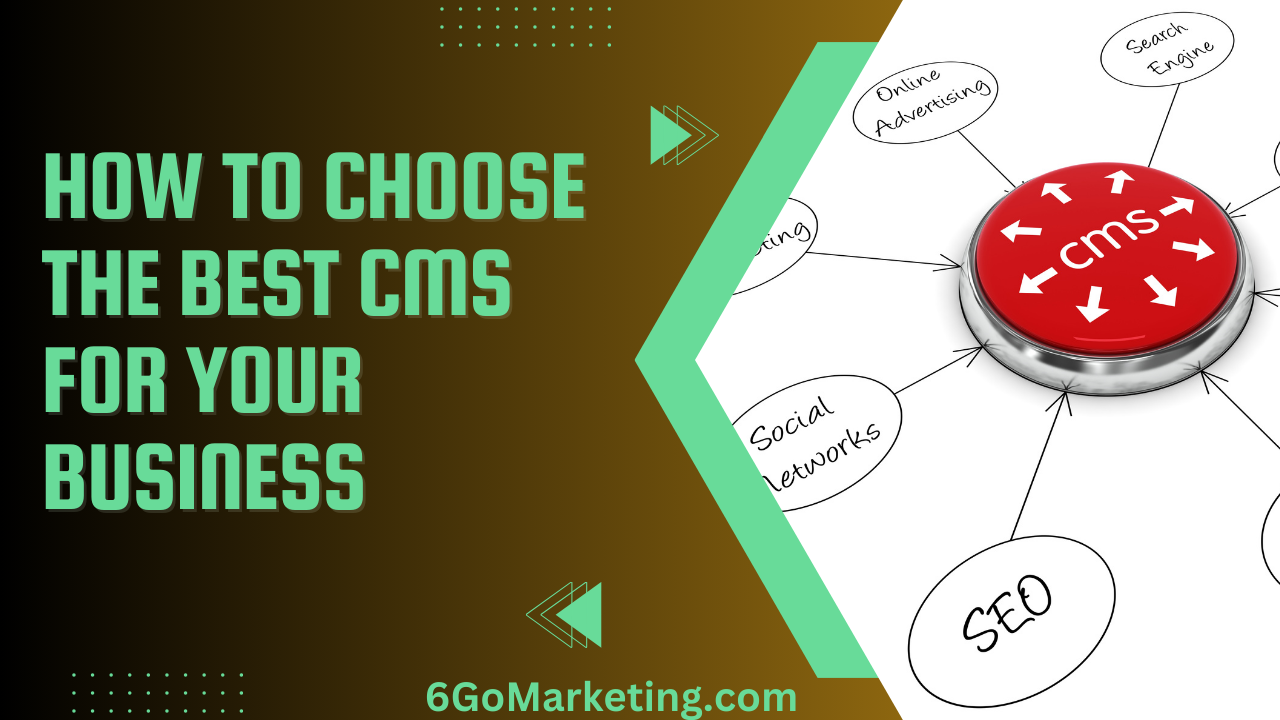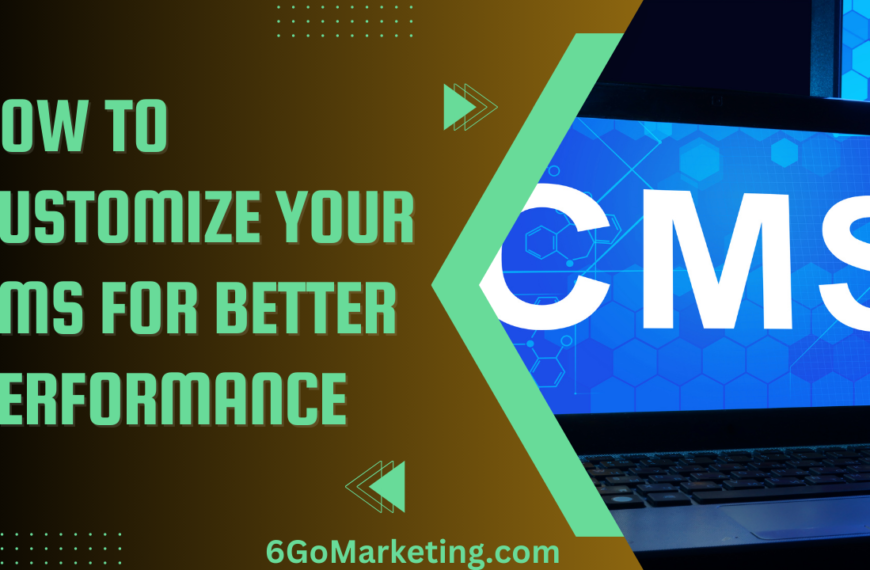In today’s digital age, having an online presence is crucial for businesses of all sizes. Whether you’re running a small local business or a large enterprise, your website plays a vital role in attracting customers and driving sales. To manage and maintain that website effectively, you need a Content Management System (CMS). But with so many options available, how do you choose the best CMS for your business?
A CMS is a software platform that enables users to create, edit, manage, and publish content without needing advanced technical skills. It simplifies the process of running a website by offering intuitive tools for content management, SEO optimization, and design customization. In this comprehensive guide, we’ll explore everything you need to know about How to Choose the Best CMS for Your Business.
Why You Need a CMS
Before diving into the details of how to choose a CMS, it’s essential to understand why having one is so important for your business. A CMS can:
- Streamline content creation: With an intuitive interface, you don’t need to rely on developers for every update.
- Improve SEO: Many CMS platforms come with built-in SEO tools that make it easier to rank higher in search engine results.
- Support growth: As your business grows, a good CMS will scale with you, allowing you to add new content and features without overhauling your entire website.
- Enhance collaboration: Multiple users can manage and publish content, making teamwork more effective.
- Save time and money: Automating many tasks such as updates and backups reduces the need for expensive technical support.
Now, let’s look at how to choose the best CMS for your business.
Factors to Consider When Choosing a CMS
Selecting the right CMS can make a huge difference in the success of your online strategy. Here are the key factors to consider:
1. Ease of Use
The ease of use is a critical factor, especially if you or your team are not tech-savvy. A CMS should offer a simple, intuitive user interface that allows you to create and manage content with minimal effort.
| CMS | User-Friendly Rating | Key Features |
|---|---|---|
| WordPress | 5/5 | Drag-and-drop builders, rich plugin ecosystem |
| Wix | 4/5 | Easy-to-use interface, templates for beginners |
| Joomla | 3/5 | More complex but powerful for advanced users |
Most small businesses prefer platforms like WordPress and Wix due to their easy-to-use interfaces and availability of drag-and-drop builders. These platforms allow you to design your website without writing code.
2. Customization Options
Your business website should reflect your brand’s unique personality. Therefore, choosing a CMS that allows for customization is important. Some CMS platforms offer greater design flexibility than others, especially when it comes to CMS personalization, enabling tailored user experiences.
| CMS | Customization Flexibility | Theme/Template Variety |
|---|---|---|
| WordPress | 5/5 | Thousands of free and premium themes |
| Drupal | 5/5 | Advanced customization options |
| Wix | 4/5 | Pre-designed templates |
Platforms like WordPress and Drupal provide thousands of themes and extensive customization options, allowing you to design a unique site that matches your brand’s identity. For businesses looking for more pre-built, easy-to-use templates, Wix is a solid choice.
3. SEO Features
Search Engine Optimization (SEO) is crucial for ensuring your website ranks well in search engine results. The CMS you choose should provide SEO features like meta tags, alt text for images, clean URLs, and sitemaps.
| CMS | Built-in SEO Tools | SEO Plugin Support |
|---|---|---|
| WordPress | 5/5 | Yoast SEO, All-in-One SEO |
| Joomla | 4/5 | Sh404SEF, EFSEO |
| Squarespace | 3/5 | Built-in tools but limited plugin support |
WordPress shines in the SEO department, with a wide array of powerful plugins like Yoast SEO and All-in-One SEO that guide you through optimizing every aspect of your site. For businesses that rely heavily on organic traffic, selecting a CMS with strong SEO capabilities is critical.
4. Security Features
Website security is a major concern for all businesses, particularly those dealing with sensitive customer information. Your CMS should have robust security features to protect your site from cyber threats, malware, and hacking attempts.
| CMS | Security Rating | Key Security Features |
|---|---|---|
| WordPress | 4/5 | Regular updates, security plugins like Wordfence |
| Drupal | 5/5 | Enterprise-level security features |
| Shopify | 4/5 | Built-in SSL, PCI-DSS compliance |
In the Drupal vs WordPress debate, while Drupal is known for its strong security features, WordPress also offers good security if you use security plugins and keep the platform updated Businesses that handle e-commerce transactions or store sensitive data should prioritize platforms with the best security ratings.
5. Scalability
As your business grows, so will your website needs. Whether it’s handling more traffic, adding new products, or expanding into new markets, your CMS must be able to scale with your business.
| CMS | Scalability Rating | Suitable for Large Websites? |
|---|---|---|
| WordPress | 5/5 | Yes, with plugins and managed hosting |
| Drupal | 5/5 | Yes, designed for scalability |
| Wix | 3/5 | Not ideal for very large websites |
Drupal and WordPress are highly scalable platforms that can handle complex websites with high traffic volumes. For small businesses with limited needs, a simpler platform like Wix may be sufficient, but it may struggle as your site grows.
6. Support and Community
The level of support you get from the CMS platform is another important consideration. Some CMS platforms have a vast community of developers and users who can provide guidance and troubleshoot issues. Additionally, official support is essential for those who need immediate help.
| CMS | Support Options | Community Size |
|---|---|---|
| WordPress | Large community forums, paid support options | Huge, global developer community |
| Squarespace | 24/7 customer support | Smaller community, but active support |
| Drupal | Community forums, third-party support options | Large, technical community |
WordPress benefits from a massive user and developer community, meaning that you’ll rarely struggle to find tutorials, guides, and forums offering help. For businesses that need 24/7 support, platforms like Squarespace offer professional, round-the-clock customer service.
7. Cost and Pricing
The cost of running your website is a crucial factor, especially for small businesses. While some CMS platforms are free to use, you may need to pay for hosting, themes, plugins, or additional services.
| CMS | Pricing Structure | Free Version Available? |
|---|---|---|
| WordPress | Free (with optional paid themes and plugins) | Yes, but requires hosting |
| Wix | Free plan available, premium plans start at $14/month | Yes, with limited features |
| Shopify | Premium plans starting at $29/month | No, 14-day free trial |
WordPress is an open-source platform, meaning the software itself is free, but you will need to pay for hosting and premium features if needed. On the other hand, platforms like Wix and Shopify offer different pricing tiers depending on your requirements.
8. E-commerce Capabilities
If you plan to sell products or services online, it’s essential to choose a CMS for ecommerce that includes built-in features or the ability to integrate with e-commerce platforms.
| CMS | E-commerce Compatibility | Popular Integrations |
|---|---|---|
| Shopify | 5/5 | Fully integrated with payment gateways |
| WordPress | 4/5 | WooCommerce plugin |
| Wix | 3/5 | Built-in e-commerce tools for small stores |
For businesses focused on e-commerce, Shopify offers a fully integrated experience with built-in tools for product listings, payment processing, and shipping. WordPress is also a great option for e-commerce if combined with the WooCommerce plugin.
Popular CMS Options
Now that we’ve explored the factors you need to consider, let’s take a look at some of the most popular CMS platforms available for your business.
1. WordPress
As the most widely used CMS, WordPress powers over 43% of websites on the internet. Its popularity stems from its ease of use, extensive customization options, and robust plugin ecosystem. With WordPress, you can build anything from a simple blog to a fully-fledged e-commerce store.
2. Wix
Website designing takes time and if you are looking for an easy to go solution, Wix is the place to be at. Wix is an easy-to-use, drag-and-drop website builder designed for small businesses and personal projects. While it’s not as powerful as WordPress, it’s perfect for users who want to build a website quickly without coding.
3. Drupal
Drupal is an open-source CMS known for its flexibility and scalability. It’s commonly used by large enterprises and government websites because of its robust security features and ability to handle complex content.
4. Shopify
For businesses focused on e-commerce, Shopify is one of the most popular and fully integrated CMS platforms available. It’s designed specifically for selling products and services online, offering a complete suite of tools for managing product listings, processing payments, handling shipping, and more. Shopify requires no technical skills to set up, making it an excellent option for small businesses and entrepreneurs.
Key Features of Shopify:
- Built-in Payment Gateway: Shopify supports a wide range of payment options, including credit cards, PayPal, and Shopify Payments.
- Inventory Management: Track stock levels, manage orders, and handle fulfillment directly within the platform.
- App Store: Shopify offers thousands of apps that can extend your store’s functionality, from marketing tools to inventory systems.
- Responsive Design: All Shopify themes are mobile-friendly, ensuring your store looks great on any device.
Quote: “Shopify has revolutionized how small businesses sell online by providing a simple yet powerful platform for e-commerce.” – Forbes
5. Squarespace
Squarespace is another user-friendly CMS that combines beautiful design with powerful e-commerce capabilities. While it’s not as customizable as WordPress or Drupal, it offers a sleek, all-in-one solution for small businesses, artists, and freelancers looking to showcase their portfolios, blogs, or online stores.
Key Features of Squarespace:
- Beautiful Templates: Squarespace is known for its professional, high-quality design templates that are perfect for showcasing creative work.
- All-in-One Solution: Hosting, domain management, and security are all included, making it easy to manage everything in one place.
- Built-in E-commerce: Squarespace supports selling products, services, and even digital downloads.
- 24/7 Customer Support: The platform offers excellent customer support, ideal for businesses that need immediate assistance.
While Squarespace offers many useful features, its customization options are limited compared to open-source platforms like WordPress and Drupal.
6. Joomla
Joomla is an open-source CMS that falls somewhere between WordPress and Drupal in terms of complexity. It offers more flexibility and customization options than Wix or Squarespace but requires a steeper learning curve than WordPress. Joomla is best suited for websites that need advanced content management features, such as multilingual sites or complex user permissions.
Key Features of Joomla:
- Multilingual Support: Joomla offers built-in support for multiple languages, making it a popular choice for businesses with a global audience.
- Extensive Extensions: The platform has thousands of extensions that can enhance your website’s functionality, from SEO tools to e-commerce capabilities.
- Advanced User Management: Joomla provides more granular control over user roles and permissions than many other CMS platforms.
- Strong Security: Joomla has a dedicated security team that regularly updates the platform to protect against vulnerabilities.
While Joomla is powerful and flexible, it’s better suited for businesses with technical expertise or access to a developer, as the platform can be challenging for beginners.
CMS Comparison Overview
To help you make a more informed decision, here’s a comparison of some of the most popular CMS platforms based on key features:
| CMS | Ease of Use | Customization | SEO Features | E-commerce | Support |
|---|---|---|---|---|---|
| WordPress | High | High | Excellent | WooCommerce | Large Community |
| Wix | Very High | Moderate | Good | Basic | 24/7 Support |
| Shopify | Very High | Moderate | Good | Excellent | 24/7 Support |
| Drupal | Low | Very High | Excellent | Requires Modules | Large Community |
| Squarespace | High | Moderate | Good | Good | 24/7 Support |
| Joomla | Medium | High | Very Good | Requires Extensions | Large Community |
The Decision-Making Process
Now that you’ve been introduced to the most popular CMS platforms, it’s time to decide which one is the best fit for your business. Here’s a structured process to help you make the right decision.
1. Assess Your Needs
Before selecting a CMS, assess your specific business needs. What type of content will you be managing? Will you need an e-commerce platform? Does your team require collaboration tools?
Questions to consider:
- Are you running an e-commerce business?
- How often will you update your site with new content?
- Will multiple users need access to manage the site?
- How important are design flexibility and customization?
2. Evaluate Your Team’s Skills
Consider the technical expertise of your team. If you or your team members are not familiar with coding or website development, opt for a user-friendly platform like Wix, Squarespace, or Shopify. If you have access to a developer or IT professional, more complex platforms like WordPress, Joomla, or Drupal can offer more flexibility and power.
Alternatively, if you’re seeking a highly customizable and responsive web solution without the hassle of coding, you can also hire WeWeb developers to help you create a unique website tailored to your needs.
3. Set Your Budget
Different CMS platforms come with varying costs. While some platforms, like WordPress, are free to use, you may need to pay for hosting, premium themes, and plugins. Platforms like Shopify and Squarespace offer subscription-based pricing, which can be more predictable but may cost more in the long run depending on your needs.
4. Test and Compare
Many CMS platforms offer free trials or demos. Take advantage of these to test different systems and see which one works best for you. Compare how easy it is to perform basic tasks like publishing content, changing website layouts, and adding new features.
5. Plan for Growth
Your business may grow over time, and your website needs will evolve. Choose a CMS that can scale with your business. For instance, WordPress and Drupal offer a high degree of scalability and can handle thousands of pages, visitors, and additional features. Meanwhile, simpler platforms like Wix and Squarespace might struggle with large, complex websites.
Real-World Examples of CMS in Action
To understand how different CMS platforms perform in real-world scenarios, let’s look at a few examples of businesses and the CMS platforms they chose:
| Business Type | CMS Used | Reason for Choice |
|---|---|---|
| Small Local Bakery | Wix | Easy-to-use platform with beautiful templates |
| Online Clothing Store | Shopify | Full-featured e-commerce capabilities |
| Large Enterprise Website | Drupal | Scalability and advanced security features |
| Freelance Designer Portfolio | Squarespace | Sleek design templates, all-in-one solution |
| Technology Blog | WordPress | SEO optimization and content management flexibility |
Each of these businesses had different needs, and their CMS choice reflected those requirements.
Conclusion
Choosing the right CMS for your business is a crucial decision that can significantly impact your online success. By considering factors such as ease of use, customization options, SEO capabilities, security, scalability, and cost, you can find a platform that meets your needs and supports your business as it grows.
There’s no one-size-fits-all solution when it comes to CMS platforms. For a small e-commerce business, Shopify might be the best choice, while a large corporate website might find Drupal more suitable. If you’re unsure, you can always start with a platform like WordPress or Wix and scale up as your needs evolve.
Ultimately, the best CMS for your business is one that aligns with your goals, is easy to manage, and supports your long-term growth. Take the time to assess your options, test different platforms, and invest in a CMS that empowers your business to succeed in the digital world.









